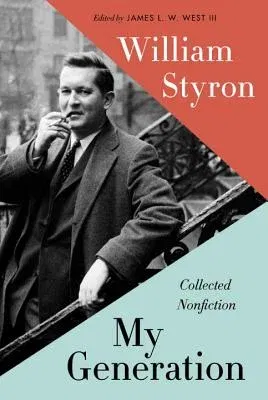A vital, illuminating collection of the Pulitzer Prize and National
Book Award winner's elegant, passionately engaged nonfiction
My Generation is the definitive gathering of William Styron's
nonfiction, exposing the core of this greatly gifted, highly convivial,
and profoundly serious artist from his literary emergence in the 1950s
to his death in 2006.
Here are fifty years of Styron's essays, memoirs, reviews, op-eds,
articles, eulogies, and speeches, reflecting the same brilliant style
and informed thinking that he brought to his towering fiction and to a
deeply committed public life. Including many newly collected and
never-before-published items, this compendium ranges from the original
mission statement of The Paris Review, which Styron helped found in
1953, to a 2001 tribute to his friend Philip Roth--creating an essential
overview of arts and letters during the post-World War II years.
In these pages, Styron writes vividly of childhood days in Tidewater
Virginia spent going to movies, not reading books. ("It does not mean
the death of literacy or creativity if one is drenched in popular
culture at an early age.") He recalls being among the group of soldiers
who would have been sent to invade Japan and were saved by Truman's
decision to drop the atomic bomb, which Styron feels was the right
choice, "even though its absolute rightness can never be proved." And he
writes as few others have about midlife battles with clinical
depression, "a pain that is all but indescribable, and therefore to
everyone but the sufferer almost meaningless."
Here, too, are Styron's personal encounters with world leaders, fellow
authors, and friends, each of whom comes memorably to life. Styron
recalls sharing contraband Cuban cigars with JFK ("a naughty memento, a
conversation piece with a touch of scandal"), getting lost in the snow
with Robert Penn Warren, and party-hopping with the young James Jones
(an experience he likens to "keeping company with a Roman emperor"). The
beginnings of his masterpieces The Confessions of Nat Turner and
Sophie's Choice are chronicled here, along with the controversy that
greeted the former upon its 1967 publication. Throughout, Styron
celebrates the men and women of his generation, whose lives were forged
in the crucible of World War II.
Whether he's recounting a walk with his dog, musing on the Modern
Library's list of the hundred best English-language novels of the
twentieth century, or contemplating America's fraught racial legacy from
his point of view as the grandson of a woman who owned slaves, William
Styron writes always in urgent, finely calibrated prose. These
fascinating pieces bring readers closer to this great writer and the
world he observed, interacted with, and changed.
Praise for My Generation
"William Styron's My Generation: Collected Nonfiction is both
unsurpassably charming and unflinchingly honest, whether recounting the
fallout from The Confessions of Nat Turner or reminiscing about the
slave-owning grandmother who warned him never to forget he was a
Southerner."--Vogue
"At its most accomplished, Styron's non-fiction mixes a conscientious,
richly traditional prose style with a strong current of fellow feeling,
a certain awe at the human condition, which is what gives power to his
best fiction. . . . Styron stood tall in his generation, and the best of
him will stand up over time."--USA Today
"A must for every Styron fan's library."--BBC

